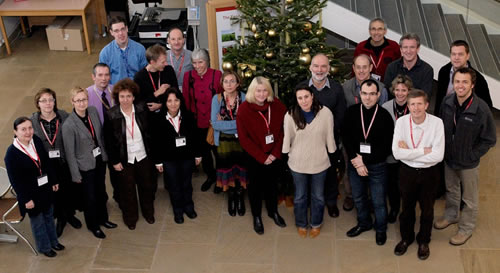
18th Meeting of the Panel on PRA Development
York, GB, 2009-12-14/17
The 18th Meeting of the Panel on PRA Development was held in York, United Kingdom, on 2009-12-14/17 in the newly created Food and Environment Research Agency (Fera, British National Plant Protection). The Panel followed a different procedure than in previous years, as the work was focused on reviewing the first results of the EU project on PRA, “PRATIQUE” in which EPPO is involved (see https://secure.fera.defra.gov.uk/pratique/). The meeting therefore aimed at providing guidance for further work, but no change would be implemented in the EPPO decision-support scheme (EPPO DSS, PM5/3(4)) before the end of the PRATIQUE project in March 2010.

The results of the following Work Packages (WP) within PRATIQUE were presented to the Panel members:
- WP 1 – Identifying and integrating key national and international datasets
About 800 datasets have been gathered containing information on the pest in its current area of distribution, on pathways, on production and economic datasets, on the area under consideration for the PRA and on the pest management. The quality and usefulness of these datasets were assessed. The data sources have been integrated into a dataset explorer (a system that stores the datasets in a database and provides ready access) and are currently available as Excel spreadsheets on the PRATIQUE website.
- WP 2 – Enhancing techniques for economic, environmental and social impacts
One of the tasks of WP2 is to determine the key indicators required for impact assessment and to develop a quantitative scoring system for these indicators that can be related to the five levels of scoring required for each question in the EPPO PRA scheme (minimal, minor, moderate, major or massive). Basic principles for elaborating indicators and scoring systems (the use of logarithmic scales, time dependency, etc.) as well as the re-ordering of questions were discussed and will allow further developments.
- WP 3 – Enhancing techniques for standardising and summarising pest risk assessments & dealing with uncertainty
PRA structure flowcharts for the entry and establishment parts of the EPPO DSS were discussed and approved by the Panel. As rating guidance is necessary to provide consistency in the different assessments performed with the EPPO DSS, some have been developed for entry and establishment. The Panel welcomed in particular the inclusion of examples in the rating guidance. Techniques for summarizing risks and quantifying and communicating uncertainty in pest risk assessment were presented: the knowledge based approach (KBA), the Bayesian Belief Network (BBN), and the Invasive Risk Impact Simulator (IRIS) a tool developed within the Great Britain non-native risk analysis Panel process.
WP 6 - Project validation and dissemination with the development of a web-based PRA scheme
A computer programme called CAPRA (Computer Assisted PRA) which had been developed by the EPPO Secretariat was presented to the Panel. The computer programme is a web downloadable standalone version that has to be installed on individual computers. All sections of the EPPO Decision-Support Scheme for quarantine pests are included and hyperlinks to the definitions of terms of the Glossary of phytosanitary terms (ISPM No.5) are available. The different sections of the EPPO DSS can be performed independently and no longer need to be completed in a fixed sequence. The programme is at present only available for download to PRATIQUE partners, EPPO Panels and Expert Working Group.
